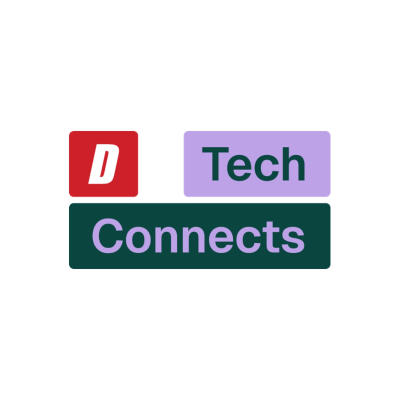
Tech Connects
inglés
Negocios
Empieza 7 días de prueba
$99 / mes después de la prueba.Cancela cuando quieras.
- 20 horas de audiolibros al mes
- Podcasts solo en Podimo
- Podcast gratuitos
Acerca de Tech Connects
Tech Connects is where technologists, executives, hiring managers, recruiters, and entrepreneurs all gather to discuss some of the biggest questions facing technology and technologists today, with a special focus on tech hiring and careers. We'll discuss everything from the current state of tech employment to how organizations are adjusting to the ever-changing future of tech work. Along the way, we'll provide the insight that recruiters and hiring managers need to understand, attract and create the right environments for tech candidates, while technologists will find information vital to building their dream careers.Tech Connects is a production of DHI Group, Inc., the parent company of Dice.com. Hosted on Acast. See acast.com/privacy for more information.
Todos los episodios
67 episodiosRecruiting and Training in a World of AI Content
The way companies train their workforce has changed. Mike Pitta, Talent Principal at Guild, explains how AI is driving a shift from episodic training programs to continuous, on-demand learning across all roles—not just technical teams. Key insights from this conversation: * Low-level coding tasks are being automated, pushing companies to prioritize soft skills like communication, critical thinking, and business fluency over specific programming languages * Adaptability and resilience have become trainable skills that companies can systematically develop * The hiring process faces "signal collapse" as AI-tailored resumes make candidates look increasingly similar on paper, elevating the importance of credentialing and authentic interviewing * Peer-to-peer AI adoption through champion programs beats top-down mandates from leadership * Guild's data shows companies achieve roughly 3X ROI on employee training investments through improved retention and accumulated internal knowledge Mike shares practical examples of scaling AI tools at Guild, from automated interview note-taking to building internal champion networks. He also gives technologists specific advice on which skills to prioritize: communication with non-technical stakeholders, business impact fluency, systems thinking, and adaptability. Looking ahead five years, Mike predicts most learners will have personalized AI companions providing real-time learning opportunities—transforming how we develop skills throughout our careers. About Guild: Guild provides education benefits and skilling products that help companies train, grow, and re-skill their workforce. About Dice: Dice connects tech professionals with opportunities and helps companies find the talent they need. ---------------------------------------- Hosted on Acast. See acast.com/privacy [https://acast.com/privacy] for more information.
Take Control of Your Job Search with MCP Servers and Agentic AI
AI is changing how tech professionals search for jobs—and MCP servers are leading the charge. In this episode of Tech Connects, host Paul Farnsworth sits down with Nick Mertens, Data Science Manager at Dice, to explore how Model Context Protocol (MCP) servers are transforming the job search by connecting AI platforms like Claude and ChatGPT directly to live job data. Nick breaks down the current frustrations tech professionals face with keyword-stuffed resumes and ATS black holes, then reveals how MCP servers offer a smarter path forward. He explains what agentic AI actually means, how to set up automated workflows for your job search, and why AI fluency is becoming a must-have skill in 2026. Here are some quick takeaways from this discussion: Understand MCP Servers as the Bridge Between AI and Real-Time Data: MCP (Model Context Protocol) servers act as the "USB-C for AI," connecting static language models to dynamic, real-time information sources. For job searching, this means your AI assistant can now access current job postings on platforms like Dice instead of relying on outdated training data. Experiment with Dice's MCP server to see how this technology transforms your search from generic advice to actionable job matches. Agentic AI for Workflow Automation, Not Just Resume Tweaking: Move beyond using AI to simply modify your resume. Set up automated workflows like morning job digests, continuous market monitoring for specific roles in your area, or skills gap analysis to identify what you need to learn for your next career move. Agentic AI can plan, execute, and advise—but you need to give it the right tools (like MCP servers) and clear instructions. Balance Automation with Authenticity: AI can scale your job search, but don't lose your identity in the process. Use AI to automate the grind—finding relevant postings, tracking trends, drafting initial materials—but always quality-check outputs before sending applications. The goal is to use AI to create more time for genuine human connections, not to replace them entirely. Remember: companies still want to interview you, not your robot. How AI Fluency is Becoming a Core Professional Skill: AI isn't just for data scientists anymore. =Start experimenting with AI in your workflows today, whether that's setting up simple automations or diving into MCP server integrations. The barrier to entry for technical skills is lowering, but your ability to effectively use AI tools will increasingly set you apart in the job market. Thank you for joining us—and remember, Dice is your best resource to find the tech talent you need to fill your open roles, and for tech pros, the best place to grow your tech career. ---------------------------------------- Hosted on Acast. See acast.com/privacy [https://acast.com/privacy] for more information.
Is Your Design Career AI-Ready?
Kicking off a new season of Tech Connects, our new host Paul Farnsworth sits down with Amy Thibodeau, Chief Design Officer at Gusto, a platform that helps over 400,000 small businesses manage payroll, benefits, and HR functions. Amy leads product design, user research, content design, and brand design teams, giving her a comprehensive view of how AI is reshaping creative work across organizations. We explore how AI is transforming design and creative roles—not by replacing human designers, but by accelerating workflows and blurring traditional job boundaries. Amy explains how AI serves as a "sidekick" that handles time-consuming tasks like research transcription and theme analysis, while enabling designers to focus on higher-value creative work. She discusses the emergence of "design engineers" and why traditional career swim lanes are disappearing as collaboration becomes more fluid. Here are some quick takeaways from this discussion for tech professionals navigating AI's impact on creative and collaborative work: Embrace AI as a Workflow Accelerator, Not a Replacement: AI excels at handling tedious, non-creative tasks like transcribing user research, analyzing themes, and creating rapid prototypes. This frees up human creative energy for problem-solving, customer empathy, and strategic thinking. Focus on identifying which parts of your workflow can be automated versus which require human insight and creativity. Develop Cross-Functional Skills to Stay Relevant: Traditional role boundaries are dissolving as AI tools make it easier for designers to code, product managers to prototype, and teams to collaborate more fluidly. Invest in learning complementary skills outside your primary discipline—whether that's basic coding, research methods, or business strategy—to increase your versatility and value. Prioritize Curiosity and Adaptability Over Credentials: When hiring or developing your career, demonstrate active engagement with new tools and approaches rather than relying solely on traditional qualifications. The pace of change means that specific tool expertise becomes obsolete quickly, but curiosity, learning agility, and willingness to experiment remain valuable across technological shifts. Cultivate "Taste" and Customer-Centric Judgment: As AI democratizes creation, the ability to distinguish good work from mediocre output becomes increasingly valuable. Develop deep empathy for end users, understand business context, and build the judgment to evaluate whether AI-generated work truly solves customer problems. This human discernment represents a sustainable competitive advantage in an AI-abundant world. There was a lot more in this episode, of course, so listen in. Thank you for joining us—and remember, Dice is your best resource to find and hire the tech talent you need to fill your open roles, and for tech pros, the best place to grow your tech career. ---------------------------------------- Hosted on Acast. See acast.com/privacy [https://acast.com/privacy] for more information.
Episode 64: Scott Brighton, CEO of Bonterra
Our guest on 'Tech Connects' is Scott Brighton, CEO of Bonterra, a software company focused on social good that helps nonprofits raise money, manage donor relationships, and report on impact outcomes while connecting them with funders looking to give money away. We explore how AI is transforming the nonprofit sector—an area where efficiency demands are actually more intense than in for-profit companies. Scott explains how nonprofits operate under extreme constraints and why agentic AI represents a crucial breakthrough for organizations that can't afford additional staff but desperately need expanded capacity. Here are some quick takeaways from this discussion for tech professionals working with AI or considering nonprofit sector applications: Recognize Efficiency Imperatives in Mission-Driven Organizations: Nonprofits typically operate with just 20% overhead—equivalent to an 80% profit margin in for-profit terms. This creates urgent need for AI solutions that amplify human capacity rather than simply optimizing existing processes. Understanding these extreme efficiency requirements can inform how you design and implement AI systems for resource-constrained organizations. Focus on Agentic AI for Capacity Amplification: The future lies in agentic AI systems that handle complete workflows independently, like researching and writing grant applications or managing donor relationships across multiple channels. These systems essentially create "new team members" for organizations that can't hire additional staff, representing a shift from task automation to organizational capacity expansion. Address Data Challenges Through Strategic Partnerships: Smaller organizations often lack robust datasets needed for effective AI implementation. Rather than building from scratch, partnering with platforms that aggregate data across many similar organizations can provide immediate value while allowing entities to build their own datasets over time. Consider collaborative approaches to unlock AI benefits for traditionally underserved sectors. Champion Transparent and Ethical AI Implementation: Organizations focused on social good are particularly concerned about AI transparency and bias removal due to their mission-driven nature and lower technical sophistication. Developing AI solutions that prioritize explainability and ethical considerations from the ground up will become increasingly valuable as AI adoption spreads to sectors where trust and transparency are paramount. There was a lot more in this episode, of course, so listen in. Thank you for joining us—and remember, Dice is your best resource to find and hire the tech talent you need to fill your open roles, and for tech pros, the best place to grow your tech career. ---------------------------------------- Hosted on Acast. See acast.com/privacy [https://acast.com/privacy] for more information.
Episode 63: Dr. Rebecca Swift, SVP, Creative, at Getty Images
Our guest on 'Tech Connects' is Dr. Rebecca Swift, Senior Vice President of Creative at Getty Images, which provides licensed visual content to businesses worldwide. Rebecca oversees Getty's creative team that works with photographers, filmmakers, and visual researchers to understand market trends and guide their community of over half a billion creators. We explore how AI-generated imagery is reshaping visual content and what this means for tech professionals and creative businesses. Rebecca shares insights about the rapid shift in public perception of AI content, legal challenges, and how the creative industry is adapting. Here are some quick takeaways from this discussion for tech professionals working with visual content or AI tools: Understand the Trust Factor in AI Content: Consumer excitement about AI imagery has shifted to widespread distrust due to deepfakes and misleading content. Trust is fundamental to brand relationships, so factor consumer sentiment into AI content decisions. Many consumers now prefer verified authentic imagery over AI-generated alternatives. Navigate the Legal Complexities: AI-generated images can't be copyrighted, only prompts can be protected. Many AI tools use web-scraped content without proper licensing, creating IP infringement risks. Work with services that provide legal safeguards rather than open-source tools that may expose your organization to liability. Use AI for Modification, Not Pure Generation: AI excels at modifying existing content and creating iterations for marketing campaigns rather than generating entirely new authentic imagery. Becoming skilled at AI prompting requires significant time investment and is a distinct skill from traditional creative work. Leverage Authenticity as Competitive Advantage: As AI content becomes common, there's growing demand for authentic, locally-sourced content that captures current realities missing from AI training datasets. Areas like remote work culture and sustainability present opportunities for genuine human creativity. There was a lot more in this episode, of course, so listen in. Thank you for joining us—and remember, Dice is your best resource to find and hire the tech talent you need to fill your open roles, and for tech pros, the best place to grow your tech career. ---------------------------------------- Hosted on Acast. See acast.com/privacy [https://acast.com/privacy] for more information.
Elige tu suscripción
Premium
20 horas de audiolibros
Podcasts solo en Podimo
Podcast gratuitos
Cancela cuando quieras
Empieza 7 días de prueba
Después $99 / mes
Empieza 7 días de prueba. $99 / mes después de la prueba. Cancela cuando quieras.





































